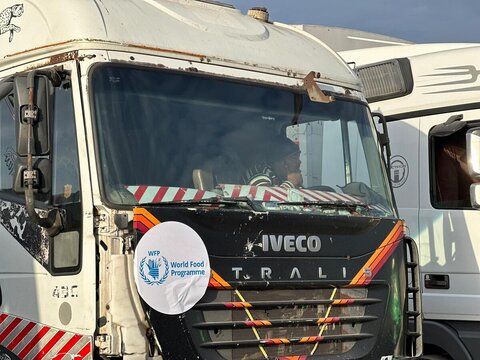‘I need food for my children – that’s it’: In Gaza, EU support is a lifeline for people facing famine

Schools in Gaza are packed with families who’ve lost their homes and family members to the bombings that have displaced almost its entire population of 2.2 million people.
The same is true of Gaza’s remaining hospitals. In their grounds, tens of thousands of families are crowded into tents – while these could reasonably accommodate up to 3,000 people, in fact they are hosting 10,000 to 30,000 people.

With next to no sanitation and washing facilities and the sound of explosions a feature of daily life, lessons for children have been replaced by a daily struggle to survive.
Deaths, devastation, disease, fear and hunger are all part of the new reality they have been cast into overnight – Gazans were in the throes of a hunger crisis even before the war. Now they are on the brink of famine.
At hunger’s border: Why aid trucks taking humanitarian gear and food into Gaza face long waits

When the coast is clear – for shifting battlefronts make access a daily problem for humanitarian agencies – the World Food Programme provides people food parcels, canned food, or wheat flour.
That small amount of aid is the difference between life and death as WFP staff – themselves running on empty – work around the clock to avert famine.

For children, boxes from UN agencies that contain essentials and food such as nutritious biscuits are among few signs they have that the outside world has not completely forgotten and forsaken them.
WFP urgently needs US$314 million to assist the majority of Gaza’s residents through to May.
Meet Abla
Abla is displaced mother from Gaza City living in a camp in Deir El Balah in southern Gaza
We were staying in a school, it got hit, so we moved again. We left with only the clothes on our back, this prayer-set, and nothing else. We walked from Gaza City to Deir El Balah (16km away), we just kept walking without looking back, afraid of the sounds of bombing behind us.
There are 12 people living in this tent. God only knows how we are surviving. We came with nothing, no money, no clothes.
We were in the school, and suddenly there were airstrikes. Many people were killed. We prayed and started walking, we walked from morning till sundown. We would take short breaks to get warm and for the children. We have a lot of children.
I have children in Gaza City that I've not heard anything about. We all left. We were separated. It was the toughest day of my life.
We came to this school. We were told we had to evacuate again. There was bombing everywhere.
What I need the most is wheat flour. I need food for my children. That’s it. I don’t care if we sleep on the floor but they need to be fed, so I have something to give my child when he cries for food. The children are crying out of hunger and cold. No blankets, no mattresses, nothing.
We stand in line from the morning until the evening only to get a gallon of water.
Meet Um Ali
Um Ali lost three sons when her home was destroyed in Deir El Balah. Now she lives in a school serving as UN shelter with her two surviving sons and four daughters. They became displaced shortly after the war began in October.
We are living a war, under siege. The displaced people in the school are not able to afford a loaf of bread. A bag of wheat flour is sold for 370 shekels (on the black market from US$100), people have no money.
We haven’t had wheat flour in two months.
There are more than 10,000 displaced people staying in this school. The amount of food coming in is only enough for 3,000 people. Where will people find money to buy anything? Hunger has eaten up the people living in this school.
There are no blankets or mattresses, people sleep on the ground, the sky is their blanket, and the ground is their mattress.
When I see children wearing only shorts and t-shirts while it’s pouring outside, I cry from the bottom of my heart.
We do not want anything other than going back to our homes, I want to erect a tent in the place of my home which was destroyed, instead of living this humiliation, waiting in lines to get bread and water. I see young men falling down while walking because of lack of nutrition.



